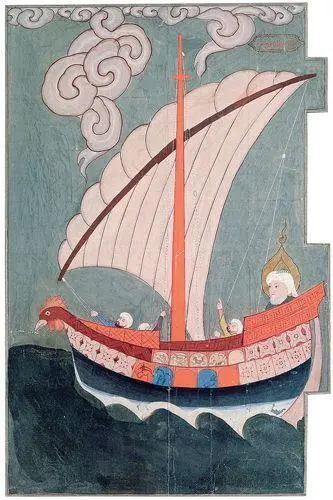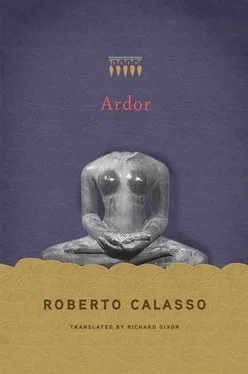
Noah left the Ark, obeying Elohim’s command. And with him all other creatures, one by one, countless pairs of animals of every species. Long processions, especially of insects. As many left the Ark as had entered, since none of them had had intercourse during the voyage. Intercourse was forbidden in times of calamity. And during the long months of the voyage, even death was held in abeyance, even for those whose lives were fleeting. Noah didn’t know what Elohim intended to do now. His last manifestation had been a disaster that had wiped away the land. And now his voice was inviting him to set foot once again on land that was barely dry. But what if Noah had got it wrong, from the very start? What if he himself had incurred the wrath of Elohim, as had happened to the rest of his generation? So Noah decided to do something that had never been done before. He built an altar. No more than a block of stone. But no one had thought of doing such a thing until that moment. Then Noah made a choice “among every clean beast and of every clean fowl” and killed them, beside the altar. Then he laid out the various pieces of flesh on the altar so that they burned completely. This is what we must assume, since the chronicler says that he “made holocausts rise on the altar.”
It was a strange, systematic slaughter of single animals. And their corpses were laid out on the same stone block. Yahweh was satisfied. The smell of the burnt flesh, horrible to men, was sweet to his nostrils. When Utnapištim did the same as Noah in Mesopotamia, after the flood, “the gods gathered like flies around the officiant.” Yahweh, on the other hand, did not move but began to think. He decided he would not “curse the ground any more for man’s sake.” Had his opinion of man perhaps changed? No. He thought then, as he had done before the flood, that “the object of man’s heart is evil from his youth.” This was how man was made. But this was no reason for man and the earth to be destroyed, as had almost just happened. Nevertheless, man had to follow certain rules. And his life had to undergo certain changes. First of all, from that day forth, men would inspire “fear and dread” in all creatures. This was itself something new, since, immediately before creating Adam, Elohim had thought only of offering him and his descendants “authority” over all the creatures of the earth. Between “authority” and “fear and dread” there was a distinct difference. But it was now the era after the flood —and this was a sign of it. Elohim then proclaimed another innovation: “Every moving thing that lives shall be food for you, like the green herb: I have given you all this.” Only one proviso was attached: “But you shall not eat flesh with its soul, which is the blood.” There were then a few words about killing. Any being that has killed a man — whether the killer is an animal or another man — would in turn be killed. We are not told by whom, hence it would not necessarily be revenge. The only certainty was that the killer would be killed, even if it was an animal that had killed a man. The killing of a human was a cycle from which there was no escape. And Elohim added: “For in the image of Elohim, Elohim has made man.” They were the same words that Elohim had thought before creating man, but which perhaps he had never spoken to him. About this, the chronicler doesn’t tell us. But those words are now spoken to Noah, immediately after the moment in which Yahweh had thought that “the object of man’s heart is evil from his youth.” And so that being which had been formed in the image of Elohim kept in his heart the desire for evil. Thus it was, and thus it must continue to be, thought Elohim. It was one of his thoughts that men most ignored.
In making his first “covenant” with mankind, Elohim limited himself to two actions: eating and killing. He made no mention of idols, adultery, stealing, or respect for parents, as if the only possible guilt serious enough to violate the covenant was centered on eating and killing. Eating also came within the sphere of killing, since Elohim now allowed flesh to be eaten. More precisely, the flesh of slain animals. But if the blood, being the soul, was eliminated from that flesh, then the killing would not have been a true killing. It involved Elohim in a line of reasoning that was very similar to that of certain Vedic ritualists in relation to sacrifice.
Finally, Elohim declared that the rainbow would be the seal of the covenant. It was a pact containing very few rules. When, over the years, Elohim felt the need to renew the covenant, all would be expanded. But for now, with Noah, he wished to add nothing else, as if those meager instructions included all the others that would be added in the future. In the first place, man was granted dominion over nature. He was allowed a surplus of force over all other beings. At the same time Elohim reserved life to himself. So man would therefore never be self-sufficient. So man could kill animals, but not eat their blood. So man had to perform sacrifices, because only after sacrificing had he become once again agreeable to Elohim. There was an obvious difficulty in these precepts, for man — in order to sacrifice as well as to eat — had to take the life of other creatures. But Elohim thought this could be overcome: to eat the flesh of animals, all that man had to do was drain the blood away. And in the sacrifice? Noah had celebrated a holocaust, where the animal was wholly consumed by fire. More than losing its life, it disappeared from the face of the earth — and passed on in its entirety to Elohim. For the moment, human life could proceed on that basis.
* * *
Anyone wishing to approach the phenomenon of sacrifice through the Bible will come up against two questions: why did Abel, “after a certain time” and after his elder brother Cain had offered to Yahweh “the first fruits of the earth,” wish to kill “the firstlings of his flock” to offer them with “the fat thereof” to Yahweh? And why did Noah, as soon as he set foot on dry land, want to kill examples “of every clean beast and of every clean fowl” to offer them to Yahweh?
The word offering or oblation appears for the first time in the Bible in reference to Cain. And Cain’s offering—“fruits of the earth”—can be interpreted as a gesture of homage of someone who offers a guest the finest that he has. At that time man was allowed only to feed on the fruits of the land. And so to offer it to Yahweh was a pious and evocative gesture, as if Yahweh wished to share those fruits with man.
The case of Abel is quite different. Until then the Bible had never mentioned the act of killing. And the eating of flesh had not yet been permitted by Yahweh. It is therefore strange that Abel should feel the need to kill some of his animals to offer them to Yahweh. If his gesture was to be interpreted as an imitation of that of his brother Cain, it was as if Abel were offering that animal flesh to Yahweh (“with the fat”) that Yahweh himself had not yet allowed man to eat.
While the offering is linked to the figure who will become the epitome of malice, the killing is the gesture of two men about whose goodness there is no doubt. Yet at the same time the gesture of offering is an essential characteristic of the devout man, while killing is the first of all evils. Sacrifice and murder, offering and killing: a conundrum from the very beginning, which history cannot unravel. Indeed, history will be marked by failed attempts to unravel it.
* * *
Sacrifice is powerful, but it does not remedy all guilt. If someone sins “with his hand raised ( be-yad ramah ),” going deliberately against the law, it is stated in Numbers that no sacrifice can redeem it. He will then be “cut off” from among his people. The sacrifice of atonement, haṭṭa’t , can therefore serve only to remedy sins committed “unwittingly” by the individual or by the community. But how can the whole community be aware of sins that it has committed “unwittingly”? Neither Leviticus nor Numbers tells us. The answer is implicit. The sacrifice of atonement presupposes the attainment of awareness. Indeed, the sacrifice itself is awareness, as if the act of becoming aware were also to imply the act of killing. This is the hardest and most mysterious point of sacrifice. And, consequently, also of awareness. Why does becoming aware of something make it necessary to kill an animal? For the sins of the community it was a bullock, for those of an individual a ram.
Читать дальше













